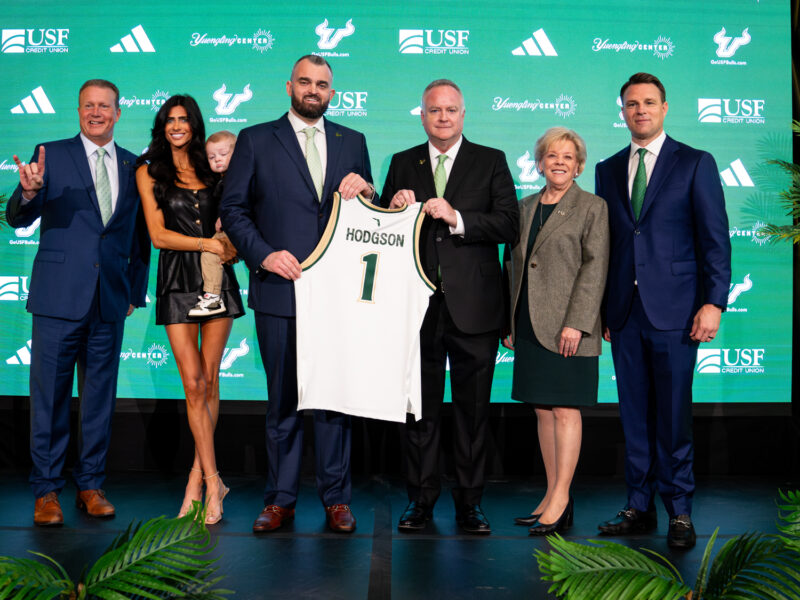Courtesy of FWC Fish and Wildlife Research Institute
By Alisha Durosier
A manatee was rescued in Bayboro Harbor on the University of South Florida St. Petersburg campus after being discovered by USF St. Petersburg Regional Chancellor Christian Hardigree and student Hailey Hayes.
Rescued by the Florida Fish and Wildlife Conservation Commision’s Fish and Wildlife Research Institute on Jan. 19, the young manatee suffered from cold-stress, a condition similar to hypothermia. Manatees are vulnerable to cold-stress when exposed to water temperatures below 68-degrees. Once the manatee was rescued, it was transported to ZooTampa.
Hayes was sitting by the harbor when she noticed Hardigree looking into the water.
“I thought okay, there’s gotta be something there. You know, we’re in St. Pete, It’s gorgeous out, there’s got to be some interesting critter in the water,” Hayes said.
As Hayes walked towards the Chancellor, she noticed the snout and outline of a manatee.
“She came over, we started talking and I said, ‘I think this little fella is hurt because it’s not moving …’ And I was out there for about 20 minutes, maybe 15,” Hardigree said.
The pair decided to report the manatee sighting to the FWC. While Hardigree contacted the FWC from her office, Hayes remained with the manatee and described its appearance to the FWC.
“It seemed to be moving very slowly, kind of floating towards the surface, not really going down and doing things on the ocean floor and coming back up for air but rather floating at the surface,” Hayes said.
Shortly after Hayes sent them photos and videos of the manatee, the FWC dispatched their marine mammal rescue team.
“It all happened so quickly and so it looked effortless, though it definitely was not. They did such a good job carrying through the entire rescue plan,” Hayes said.
The manatee, named Brisk by ZooTampa’s critical care team, is in critical condition but currently stable.
“She is definitely young and this is her first winter without her mom,” Molly Lippincott, senior curator of Florida & Marine Life at ZooTampa, said.
As migratory species, manatees migrate to warm waters during winter months when temperatures begin to lower. Young manatees that do not migrate with their mother or manatee companions have a high risk of getting lost.
“If it’s their first winter without mom, and they just don’t understand what to do, they may end up in a location and really not know how to migrate to their closest warm water site. So, it sounds like that’s probably what happened,” Lippincott said. “So, the good news is she was found and she wasn’t in that space too long.”
The first step for Brisk’s recovery, like other manatees who suffer from cold-stress, is to increase her body temperature.
“They should be in the high 90s, like ourselves,” Lippincott said. “So [we] get them on antibiotics, give them some fluids, get them in a warm pool, which is 85 degrees, to get that body temperature back up. And then after that, each day, we base things based on what we’re seeing.”
Brisk started off in a shallow pool so she wouldn’t have difficulty coming up for air. Over the next few weeks, the critical care team will assess how she will do in deeper water.
Recently ZooTampa has seen an influx of distressed or injured marine life. Brisk has a few other companions in the critical care pool, all of which are suffering from cold-stress.
“This time of year, it is cold-stress for the most part that we get animals in,” Lippincott said. Another manatee was rescued from Bayboro Harbor exactly a year prior from Brisk’s rescue.
“So, if you see an animal sitting in your backyard or in a canal, and you’re like, ‘it’s just so cold today, what are they doing out there,’ it’s probably worth investigating,” Lippincott said.
The first signs of cold-stress within manatees are bleached skin, white lesions and lethargic behavior.
“We do attribute the reason for our numbers also going up [because] people know what to look for. And they know to call FWC,” Lippincott said.
Once Brisk recovers she’ll be placed in ZooTampa’s front manatee pools with other manatees, and once she reaches 600 pounds, she will be released into the TECO Power Plant, the closest warm water site.
Students who see potentially injured marine life in Bayboro Harbor can call the FWC wildlife alert number: 1-888-404-3922.
“The other thing they can do is come up to our office [Bayboro Hall]. My staff knows what to do,” Hardigree said.



